Home Storage & Organization
Maximizing Space: The Ultimate Guide to Organizing and Customizing Your Reach-In Closet
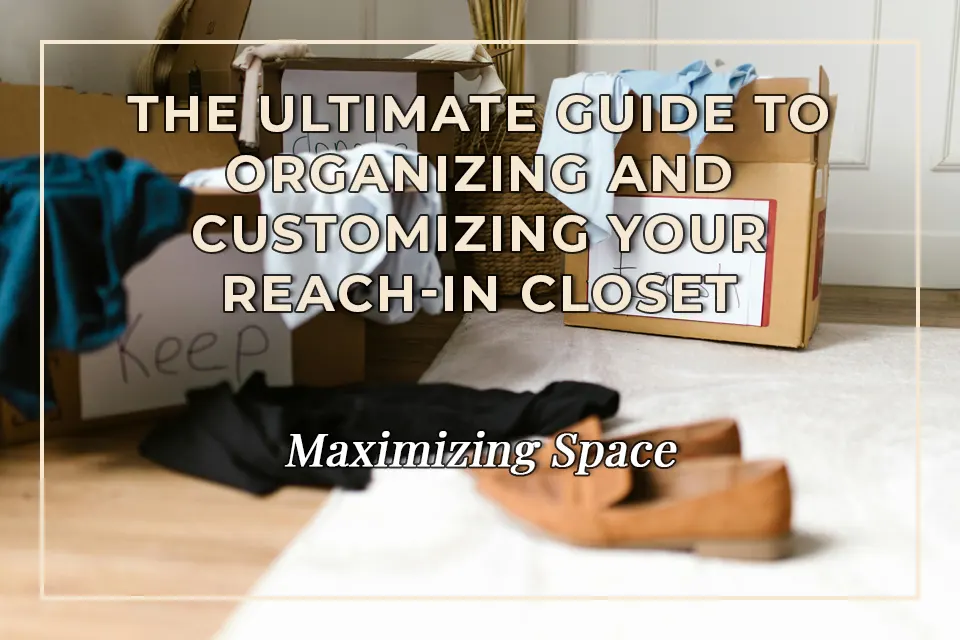
Reach-in closets are a staple in many homes, offering a compact yet efficient storage solution for clothing and accessories. Unlike walk-in closets, these are designed for easy access without stepping inside, making them ideal for rooms with limited space. With thoughtful design and organization, reach-in closets can be transformed to maximize storage and enhance the aesthetics of your space.
Understanding Reach-In Closets
A reach-in closet is typically a shallow, enclosed space integrated into a wall, allowing users to access their belongings by reaching in rather than walking in. Commonly found in bedrooms, hallways, and entryways, these closets are designed to store clothing, shoes, and other personal items in an organized manner.
Standard Dimensions of Reach-In Closets
The typical dimensions for a reach-in closet are approximately 6 feet in length, 8 feet in height, and 24 inches in depth. This depth is sufficient to hang clothes without them touching the back wall. Widths can vary, usually ranging from 3 to 8 feet, depending on the available space in the room.
Designing Your Reach-In Closet
Effective design is crucial to maximize the functionality of a reach-in closet. Incorporating a combination of hanging rods, shelves, and drawers can help accommodate various items. Adjustable components offer flexibility, allowing the space to evolve with changing storage needs. Utilizing the full height of the closet by installing shelves up to the ceiling can provide additional storage for less frequently used items.
DIY Customization Tips
Customizing your reach-in closet can be a rewarding DIY project. Start by assessing your storage needs and planning a layout that includes a mix of hanging space, shelving, and drawers. Utilizing simple tools, you can install modular systems or build custom shelves to fit your specific requirements. Incorporating elements like built-in dressers or shoe racks can further enhance organization and accessibility.
Innovative Storage Solutions
To optimize storage in a reach-in closet, consider implementing the following solutions:
- Double Hanging Rods: Install two rods, one above the other, to double the hanging space for shorter garments like shirts and pants.
- Pull-Down Closet Rods: These rods allow you to utilize higher spaces in the closet, making it easier to access items stored at greater heights.
- Tension Rods: Versatile and easy to install, tension rods can be used to create additional hanging space for accessories or to divide sections within the closet.
Lighting Considerations
Proper lighting enhances the functionality and appearance of a reach-in closet. Options include:
- Motion-Activated Lights: These provide illumination upon detecting movement, offering convenience and energy efficiency.
- LED Strip Lights: Installed along shelves or rods, they offer even lighting and a modern aesthetic.
- Recessed Lighting: Placed just inside the closet opening and angled towards the back, recessed lights minimize shadows and provide ample illumination.
Organizational Accessories
Incorporating accessories can significantly improve closet organization:
- Velvet Hangers: These slim, non-slip hangers save space and keep clothes in place, preventing them from slipping off.
- Drawer Dividers: Useful for organizing smaller items like accessories or undergarments within drawers.
- Shoe Racks: Keep footwear organized and easily accessible, preventing clutter on the closet floor.
Common Mistakes to Avoid
When organizing a reach-in closet, be mindful of these pitfalls:
- Overcrowding: Avoid cramming too many items, as it can lead to wrinkles and make it difficult to find what you need.
- Neglecting Vertical Space: Failing to utilize the full height of the closet misses out on potential storage opportunities.
- Lack of Regular Maintenance: Without periodic decluttering and reorganization, the closet can quickly become disorganized.
Conclusion
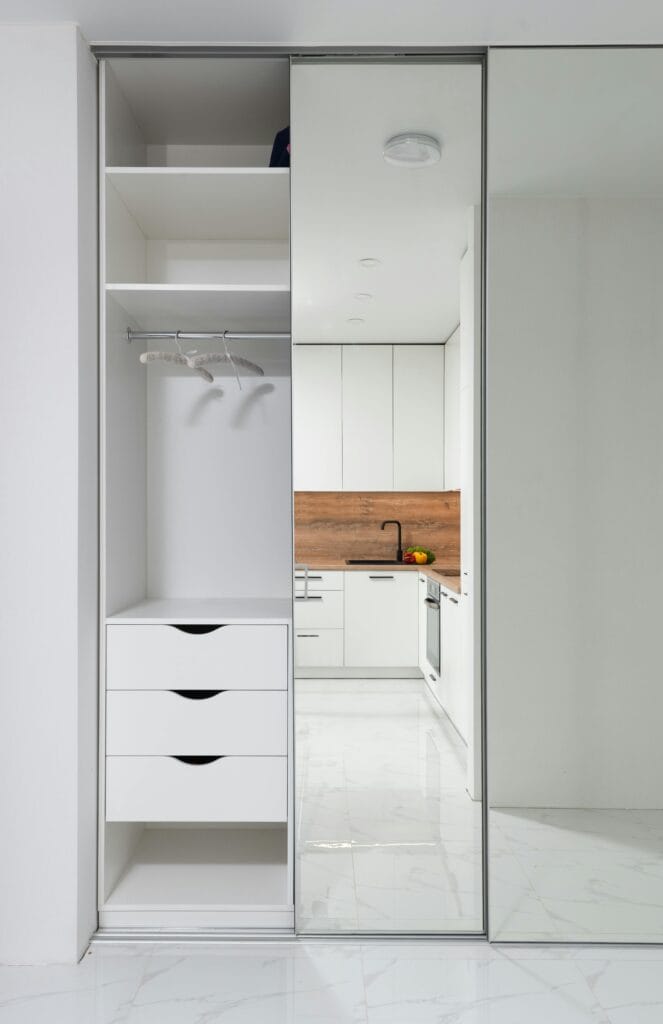
A well-designed reach-in closet can significantly enhance the organization and functionality of your living space. By understanding standard dimensions, implementing thoughtful design, and incorporating innovative storage solutions and proper lighting, you can transform a simple closet into an efficient and aesthetically pleasing storage area. Regular maintenance and mindful organization will ensure that your reach-in closet remains a valuable asset in your home.
FAQs
- How can I add more storage to a small reach-in closet?
Utilize vertical space by installing shelves up to the ceiling, use double hanging rods to increase hanging capacity, and incorporate door-mounted organizers for accessories. - What type of lighting is best for reach-in closets?
LED strip lights and motion-activated lights are popular choices, providing bright, energy-efficient illumination without taking up much space. - Are there budget-friendly ways to organize a reach-in closet?
Yes, using items like tension rods, over-the-door organizers, and stackable bins can enhance organization without significant expense. - How do I maintain an organized reach-in closet?
Regularly declutter items you no longer use, assign specific spots for each category of clothing, and make it a habit to return items to their designated places. - Can I install a reach-in closet system myself?
- Many modular closet systems are designed for DIY installation, offering customizable components that can be adjusted to fit your space and storage needs.
Home Storage & Organization
DIY Display Cabinets: Stylish Storage Ideas for Every Home and Budget
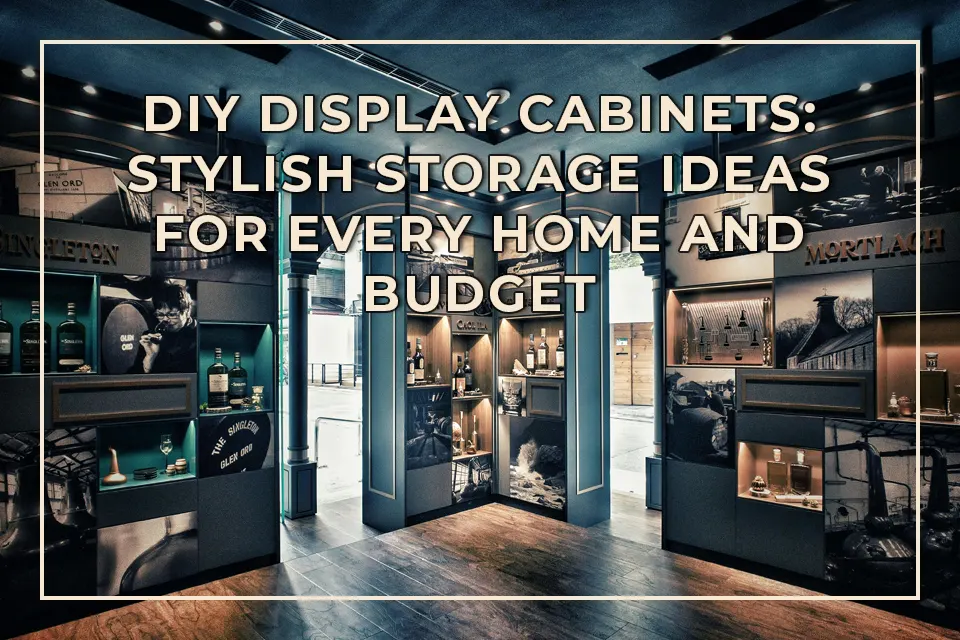
Display cabinets blend functionality with style, offering a perfect solution for showcasing treasured items while enhancing home decor. Whether you’re a DIY enthusiast or embarking on a home improvement project, understanding the nuances of display cabinets can transform your living space.
Understanding Display Cabinets
Display cabinets are furniture pieces designed to exhibit items such as collectibles, artwork, or memorabilia. They typically feature glass panels to protect contents from dust while allowing visibility. These cabinets come in various styles, sizes, and materials, catering to diverse aesthetic preferences and functional needs.
In home improvement, display cabinets serve both decorative and practical purposes. They can act as focal points in a room, reflecting personal taste and style. Additionally, they provide organized storage, helping to declutter spaces while keeping cherished items accessible and visible.
Types of Display Cabinets
Several types of display cabinets are available, each suited to different settings and purposes:
- Wall-mounted cabinets: Ideal for small spaces, these cabinets save floor space and are perfect for displaying lightweight items.
- Freestanding cabinets: These versatile units can be placed anywhere in a room and often offer more storage space.
- Corner cabinets: Designed to fit into room corners, they maximize space utilization and add a unique aesthetic touch.
- Curio cabinets: Typically tall and narrow with glass sides, curio cabinets are perfect for displaying collectibles and antiques.
When choosing a display cabinet, consider the items you plan to showcase, the available space, and the overall room decor to ensure a harmonious integration.
Materials and Finishes
Display cabinets are crafted from various materials, each offering distinct advantages:
- Wood: Offers a classic and warm aesthetic, suitable for traditional or rustic interiors.
- Metal: Provides a sleek and modern look, often used in contemporary designs.
- Glass: Allows full visibility of displayed items and adds a touch of elegance.
Finishes can range from natural wood stains to painted surfaces, enabling customization to match existing furniture and decor. Selecting the right material and finish enhances the cabinet’s appearance and ensures durability.
DIY Display Cabinet Projects
Embarking on a DIY display cabinet project allows for personalization and can be a rewarding experience. Begin by determining the cabinet’s purpose and the items it will house. Sketch a design, considering dimensions, materials, and features like shelves or lighting.
Gather necessary tools and materials, such as wood panels, glass panes, screws, and hinges. Follow step-by-step guides or tutorials to assemble the cabinet, ensuring structural integrity and aesthetic appeal. DIY projects not only save costs but also provide a sense of accomplishment and a unique piece tailored to your needs.
Integrating Technology
Modern display cabinets can incorporate technology to enhance functionality and user experience:
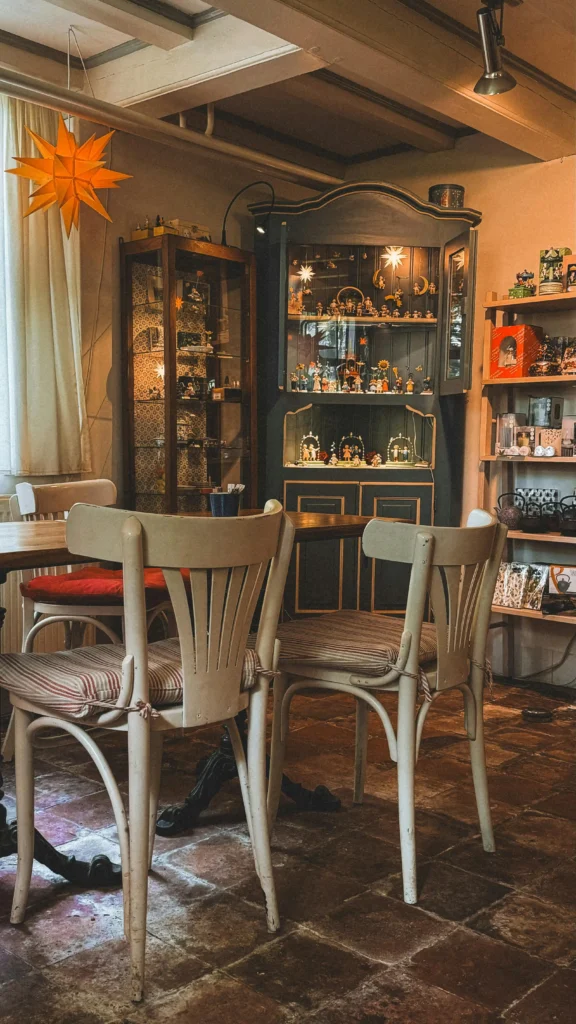
- LED lighting: Illuminates displayed items, highlighting their features and adding ambiance.
- Smart locks: Provide security for valuable items, allowing access through digital keys or biometric systems.
- Climate control: Maintains optimal temperature and humidity levels, preserving sensitive items like antiques or artworks.
Integrating these technologies ensures the safety and longevity of displayed items while adding modern conveniences.
Styling Tips
To make the most of your display cabinet:
- Curate thoughtfully: Display items with a common theme or color palette for a cohesive look.
- Balance: Arrange items of varying heights and sizes to create visual interest.
- Layering: Place items at different depths to add dimension.
- Negative space: Avoid overcrowding; leaving space between items enhances their prominence.
Regularly updating the display keeps it fresh and allows for seasonal or thematic changes.
Maintenance and Care
Proper maintenance ensures the longevity and appearance of your display cabinet:
- Cleaning: Use appropriate cleaners for the cabinet’s material. For glass, a vinegar-water solution can prevent streaks.
- Dusting: Regularly dust shelves and items to maintain clarity and prevent buildup.
- Inspection: Periodically check for any structural issues, such as loose hinges or shelves, and address them promptly.
Consistent care preserves both the cabinet and its contents, ensuring they remain in pristine condition.
Top Display Cabinet Manufacturers in the USA
When it comes to purchasing high-quality display cabinets, choosing a trusted manufacturer ensures durability, functionality, and design excellence. Here are five of the best display cabinet manufacturers in the USA that are known for their craftsmanship and customer satisfaction:
1. Closet America
Based in Maryland, Closet America is a leading name in custom cabinetry and storage solutions. They offer beautifully crafted display cabinets that are fully customizable to fit any space. Known for precision engineering and elegant designs, their cabinets are ideal for modern homes and DIY renovations.
2. Hooker Furniture
With decades of experience in the furniture industry, Hooker Furniture is known for its premium display cabinets that range from traditional to contemporary styles. Their solid wood craftsmanship and attention to detail make them a popular choice for collectors and interior design enthusiasts.
3. Canadel
A family-owned company based in Quebec with a strong presence in the U.S., Canadel specializes in customizable furniture, including display cabinets. Their products are handcrafted and made from solid birch, offering both quality and customization options.
4. Ethan Allen
Ethan Allen is a well-established American brand offering luxury furniture, including stunning display and curio cabinets. Their designs blend classic elegance with modern utility, and they provide extensive customization options in finishes and configurations.
5. Howard Miller
Known for its heritage in clockmaking, Howard Miller also produces high-end curio and display cabinets. Their cabinets are popular for showcasing collectibles and heirlooms, with built-in lighting and premium glass doors for maximum visibility.
Conclusion
Display cabinets are versatile additions to any home, offering both aesthetic and functional benefits. Whether opting for a DIY project or purchasing a ready-made piece, understanding the various types, materials, and styling options allows for a personalized and effective display solution. Incorporating technology and maintaining the cabinet ensures it remains a cherished part of your home for years to come.
FAQs
1. What are some budget-friendly materials for building a display cabinet?
Plywood and MDF (Medium-Density Fiberboard) are cost-effective materials that are easy to work with and can be finished to mimic more expensive woods.
2. How can I childproof my display cabinet?
Install safety locks on doors, use tempered glass to prevent breakage, and place heavier items on lower shelves to minimize risks.
3. Can I convert an old bookshelf into a display cabinet?
Yes, by adding glass doors and interior lighting, an old bookshelf can be transformed into an attractive display cabinet.
4. What lighting options are best for display cabinets?
LED strip lights or puck lights are energy-efficient options that provide ample illumination without generating excessive heat
Home Storage & Organization
Home Office Cabinets: Smart Storage Solutions for an Organized and Productive Workspace
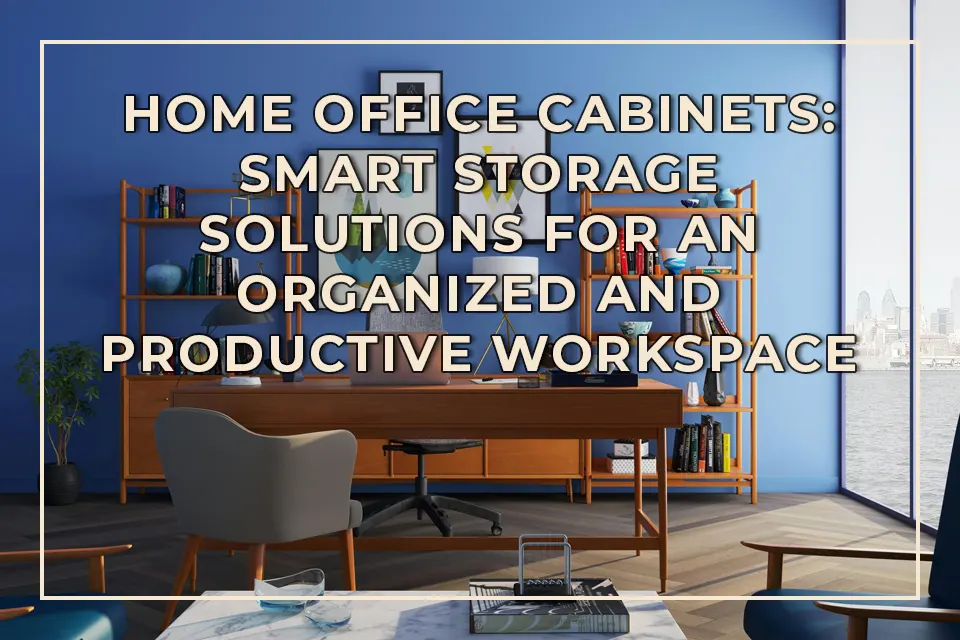
Designing a functional and organized home office is essential for productivity, and incorporating well-planned cabinets can significantly enhance your workspace. This article explores various aspects of home office cabinets, including design considerations, material choices, DIY installation tips, organization strategies, and integrating technology.
Importance of Home Office Cabinets
Home office cabinets provide essential storage solutions, helping to keep your workspace tidy and free from clutter. A well-organized office can boost productivity by ensuring that all necessary items are easily accessible. Cabinets also contribute to the overall aesthetics of the room, creating a professional and comfortable environment. By thoughtfully selecting and arranging cabinets, you can optimize your workspace to suit your specific needs and preferences.
Choosing the Right Cabinet Style
Selecting a cabinet style that complements your home office decor is crucial. Shaker-style cabinets, known for their clean lines and simplicity, offer a timeless look that fits various interior designs. For a more traditional feel, louvered cabinets with horizontal wooden slats can add character and a cottage-like charm to your workspace. Your choice should reflect your personal taste and the overall aesthetic of your home office.
Material Selection for Durability and Aesthetics
The materials used for your cabinets affect both their durability and appearance. Solid wood cabinets are sturdy and offer a classic look but can be more expensive. Plywood is a cost-effective alternative that provides strength and versatility, making it a popular choice for DIY projects. Medium-density fiberboard (MDF) is another option, offering a smooth surface ideal for painting. Consider the balance between quality, cost, and the desired finish when selecting materials for your cabinets.
DIY Installation of Built-In Cabinets
Installing built-in cabinets can be a rewarding DIY project that adds value to your home office. Begin by measuring your space accurately to ensure a proper fit. Construct the cabinet boxes using your chosen materials, ensuring they are square and level. Secure the cabinets to the wall studs for stability, and add trim or molding to achieve a seamless, built-in appearance. This process requires careful planning and attention to detail but can result in a customized and functional workspace.
Organizing Your Cabinets for Maximum Efficiency
Effective organization within your cabinets enhances productivity by keeping essential items within reach. Use drawer dividers to separate office supplies and prevent clutter. Adjustable shelving allows you to accommodate items of varying sizes, providing flexibility as your storage needs change. Labeling shelves and drawers can also help maintain order and make it easier to locate items quickly. Implementing these strategies creates a more efficient and user-friendly workspace.
Integrating Technology into Cabinet Design

Modern home offices often require the integration of technology into cabinet design. Incorporate built-in charging stations to keep devices powered and reduce visible cords. Cable management systems can help organize wires and prevent tangling. Additionally, consider installing adjustable lighting within cabinets to illuminate work areas and reduce eye strain. These technological enhancements contribute to a more organized and efficient workspace.
Top 5 Home Office Cabinet Manufacturers in the USA
When investing in high-quality home office cabinets, choosing a reputable manufacturer ensures durability, functionality, and style. Here are five of the best home office cabinet manufacturers in the USA:
- Closet America – Known for custom-built storage solutions, Closet America offers high-quality, space-efficient home office cabinets with premium craftsmanship.
- California Closets – This company specializes in custom-designed cabinetry, providing elegant and practical storage solutions tailored to your workspace needs.
- The Container Store (Elfa & Custom Closets) – Offering both modular and custom home office cabinet systems, The Container Store provides flexible solutions that fit various styles and budgets.
- Wellborn Cabinet, Inc. – A trusted name in cabinetry, Wellborn Cabinet, Inc. manufactures durable and stylish office cabinets with a wide range of finishes and materials.
- Bush Business Furniture (BBF) – This manufacturer provides ready-to-assemble and professional-grade office cabinetry, known for affordability and durability.
Each of these companies offers unique benefits, allowing you to find the perfect home office cabinets to enhance your productivity and organization.
Conclusion
Investing time and effort into designing and organizing home office cabinets can significantly enhance your productivity and comfort. By carefully selecting styles and materials, considering DIY installation, implementing effective organization strategies, and integrating technology, you can create a workspace tailored to your needs. A well-planned home office fosters efficiency and creates an environment where you can work effectively and comfortably.
FAQs
1. How can I maximize storage in a small home office?
Utilize vertical space by installing tall cabinets or shelves. Opt for multifunctional furniture, such as desks with built-in storage, to make the most of limited space.
2. What are some budget-friendly materials for DIY cabinets?
Plywood and MDF are cost-effective materials that offer durability and a smooth surface for painting or finishing, making them suitable for DIY cabinet projects.
3. How do I ensure my DIY cabinets are securely installed?
Secure cabinets to wall studs using appropriate anchors and fasteners. Ensure all units are level and properly aligned to prevent instability.
4. Can I integrate smart home devices into my office cabinets?
Yes, you can incorporate smart lighting, built-in speakers, or charging stations into your cabinets to enhance functionality and convenience.
5. How often should I reorganize my home office cabinets?
Regularly assess your storage needs and reorganize as necessary to maintain an efficient workspace. A quarterly review can help keep your office organized and clutter-free.
Home Storage & Organization
Garage Cabinets: The Ultimate Guide to Organizing, Installing, and Maintaining Your Storage Space
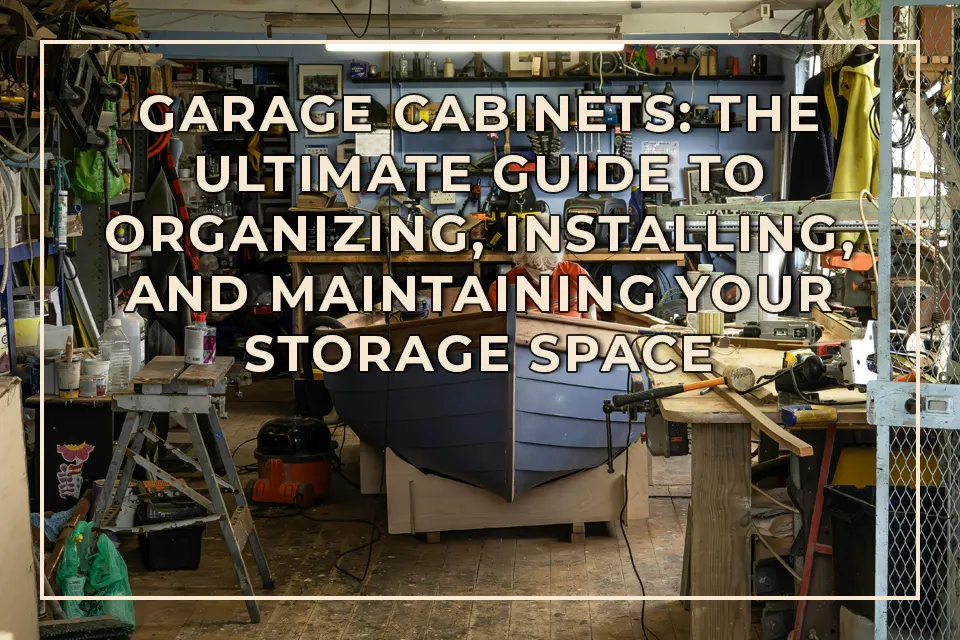
Garage cabinets are essential for organizing tools, equipment, and other items, transforming cluttered spaces into functional areas. They come in various materials and designs, catering to different needs and preferences. This article explores the benefits, types, materials, installation tips, and maintenance of garage cabinets, providing a comprehensive guide for homeowners.
Benefits of Garage Cabinets
Installing garage cabinets offers multiple advantages:
- Enhanced Organization: Proper storage solutions help categorize and store items systematically, making them easily accessible and reducing clutter.
- Increased Safety: Storing tools and hazardous materials in cabinets minimizes the risk of accidents, especially in households with children.
- Improved Aesthetics: A well-organized garage with neatly arranged cabinets enhances the overall appearance of the space
- Space Optimization: Cabinets utilize vertical space, freeing up floor area for vehicles or other activities.
Types of Garage Cabinets
Garage cabinets come in various styles to suit different storage needs:
- Base Cabinets: These sit on the floor and often support a countertop, providing storage and workspace.
- Wall-Mounted Cabinets: Attached to the walls, these cabinets save floor space and keep items at eye level.
- Tall Cabinets: Also known as pantry cabinets, they offer ample vertical storage for larger items.
- Modular Cabinets: These customizable units can be arranged in various configurations to fit specific spaces and needs.
Materials Used in Garage Cabinets
Selecting the right material is crucial for durability and functionality:
- Metal Cabinets: Known for their strength and longevity, metal cabinets, especially those made of steel, can hold substantial weight and are resistant to pests.
- Wood Cabinets: Offering a classic look, wood cabinets can be customized easily but may require treatment to prevent damage from moisture and pests.
- Plastic Cabinets: Lightweight and resistant to rust and corrosion, plastic cabinets are cost-effective but may not support heavy loads as effectively as metal or wood.
DIY vs. Professional Installation
Deciding between installing cabinets yourself or hiring a professional depends on various factors:
- DIY Installation: This approach can save money and offers a sense of accomplishment. However, it requires time, tools, and a certain skill level. Simple installations, like assembling freestanding units, are more suited for DIY, while complex setups may be challenging.
- Professional Installation: Hiring experts ensures a precise and quick setup, often accompanied by warranties. This option is ideal for custom or extensive installations but comes with higher costs due to labor charges.
Cost Considerations
The cost of garage cabinets varies based on size, material, and installation method:
- Prefabricated Cabinets: These are generally more affordable, with prices ranging from a few hundred to a couple of thousand dollars, depending on quality and size.
- Custom Cabinets: Tailored solutions offer optimal space utilization and personalization but come at a higher price, often ranging from $2,500 to $8,000 or more.
- Installation Costs: Professional installation adds to the expense, with labor costs varying based on complexity and region.
Maintenance Tips
Proper maintenance extends the lifespan of garage cabinets:
- Regular Cleaning: Wipe down surfaces to prevent dust and grime buildup.
- Moisture Control: Ensure the garage is well-ventilated to prevent moisture damage, especially for wood cabinets.
- Inspect for Damage: Periodically check for signs of wear, such as rust on metal cabinets or warping in wood, and address issues promptly.
- Lubricate Hardware: Keep hinges and drawer slides functioning smoothly by applying appropriate lubricants.
Top 5 Mudroom Cabinet Manufacturers in the USA
A well-designed mudroom enhances organization and serves as a stylish transition between the outdoors and your home’s interior. Choosing the right cabinets is crucial for creating a functional and aesthetically pleasing space. Here are five leading mudroom cabinet manufacturers in the USA:
- 1. Closet America
Based in Landover, Maryland, Closet America specializes in custom storage solutions, including mudroom cabinets. They offer personalized designs tailored to individual needs, featuring durable materials and meticulous craftsmanship. Their process includes a free design consultation, 3D modeling, and professional installation, ensuring a seamless experience from start to finish. - 2. KraftMaid
KraftMaid provides fully assembled mudroom locker cabinets designed for convenience and efficiency. Their products offer out-of-the-box storage solutions that save time and labor during installation. With a focus on quality and design, KraftMaid’s cabinets are ideal for organizing entryways and mudrooms. - 3. Wellborn Cabinet
Established in 1961, Wellborn Cabinet is renowned for its high-quality cabinetry. They offer a range of mudroom storage solutions that combine functionality with aesthetic appeal. Their commitment to craftsmanship ensures durable and stylish cabinets suitable for any home. - 4. Closet Factory
Closet Factory specializes in custom-designed mudrooms that provide efficient, family-friendly storage options. Their cabinets offer a transitional space between the outdoors and the home, helping to keep living areas clean and organized. With personalized designs, they cater to the unique needs of each household. - 5. Mod Cabinetry
Mod Cabinetry offers modern, customizable mudroom cabinets with a focus on European frameless construction. Their products are designed to maximize storage while maintaining a sleek, contemporary look. With options for semi-custom designs, they provide flexibility to suit various spaces and preferences.
Selecting the right manufacturer depends on your specific needs, budget, and design preferences. Each of these companies offers unique features and services to help you create the perfect mudroom for your home.
Conclusion
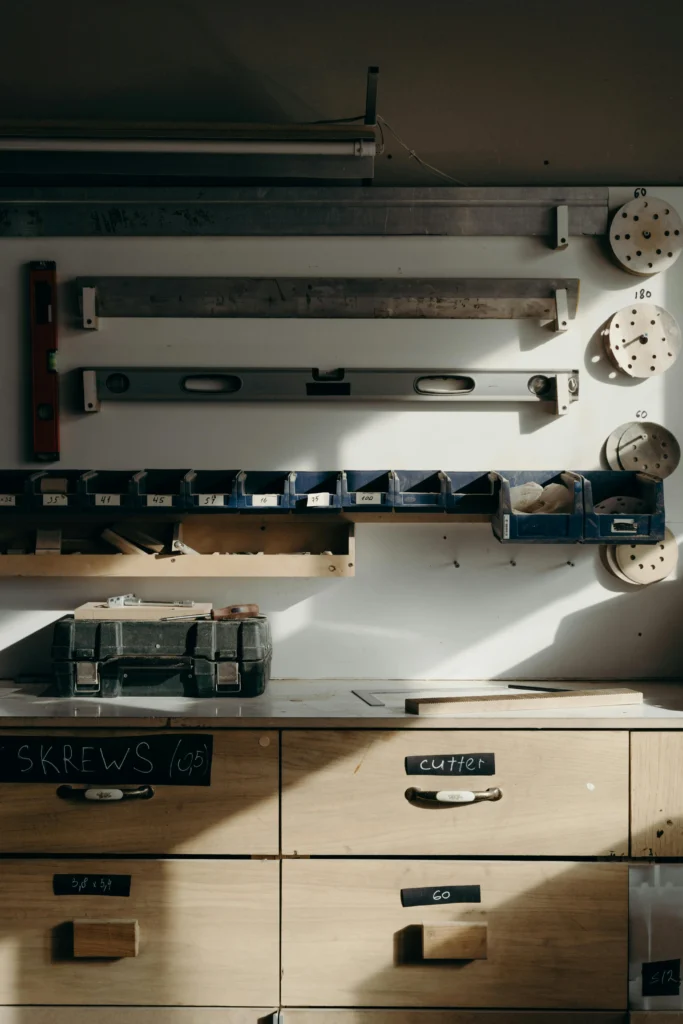
Garage cabinets are a valuable addition to any home, enhancing organization, safety, and aesthetics. By understanding the different types, materials, and installation options, homeowners can make informed decisions that suit their needs and budget. Regular maintenance ensures these cabinets remain functional and attractive for years to come.
FAQs
- What is the best material for garage cabinets?
The ideal material depends on your specific needs. Metal cabinets offer durability and strength, wood provides a classic look with customization options, and plastic is lightweight and resistant to rust. - Can I install garage cabinets myself?
Yes, DIY installation is possible, especially for simpler units. However, it requires time, tools, and some skill. For complex or custom installations, professional assistance may be more suitable. - How do I prevent moisture damage to my garage cabinets?
Ensure proper ventilation in the garage, use moisture-resistant materials or finishes, and consider installing a dehumidifier if necessary. - Are custom garage cabinets worth the investment?
Custom cabinets offer tailored solutions that maximize space and meet specific storage needs, adding value to your home. While more expensive, they can be a worthwhile investment for long-term use. - How often should I inspect and maintain my garage cabinets?
- It’s advisable to inspect and clean your cabinets at least twice a year to ensure they remain in good condition and address any issues promptly.

 DIY Closet2 years ago
DIY Closet2 years agoHow to troubleshoot and reset the red light on your Aquaguard AG 3000E

 DIY Closet2 years ago
DIY Closet2 years agoHow to Install a Drop-In Sink Without Clips: A Step-by-Step Guide

 Bug Fixing2 years ago
Bug Fixing2 years agoUnderstanding the Cost of Furnace Collector Box Replacement: What to Expect

 DIY Closet2 years ago
DIY Closet2 years agoPergola Design: Understanding the Maximum Span for 6×6 Beams

 DIY Closet2 years ago
DIY Closet2 years agoThe Best Nails for Luan: A Comprehensive Guide

 Bug Fixing2 years ago
Bug Fixing2 years agoPigtail vs Daisy Chain Outlets: Which is Better for Your Home?

 DIY Closet2 years ago
DIY Closet2 years agoHow to Build a Free Standing 6×6 Post Swing Set: A Step-by-Step Guide

 DIY Closet2 years ago
DIY Closet2 years agoUnderstanding the Benefits of a 400 Amp Meter Base with Two 200 Amp Disconnects




















